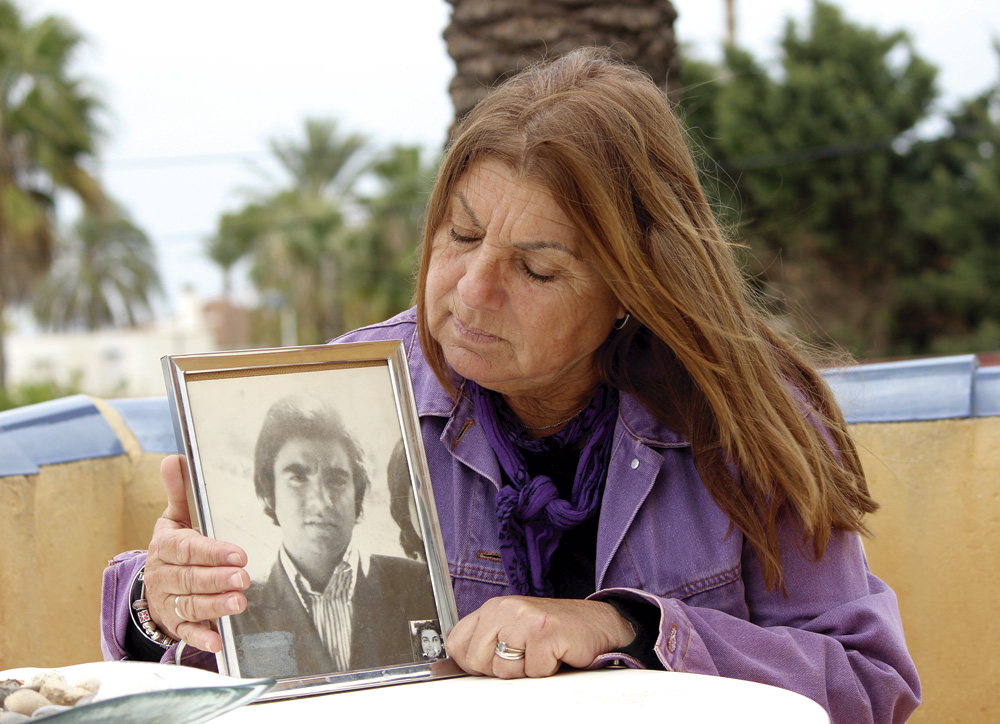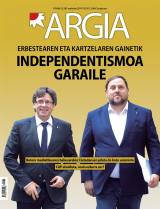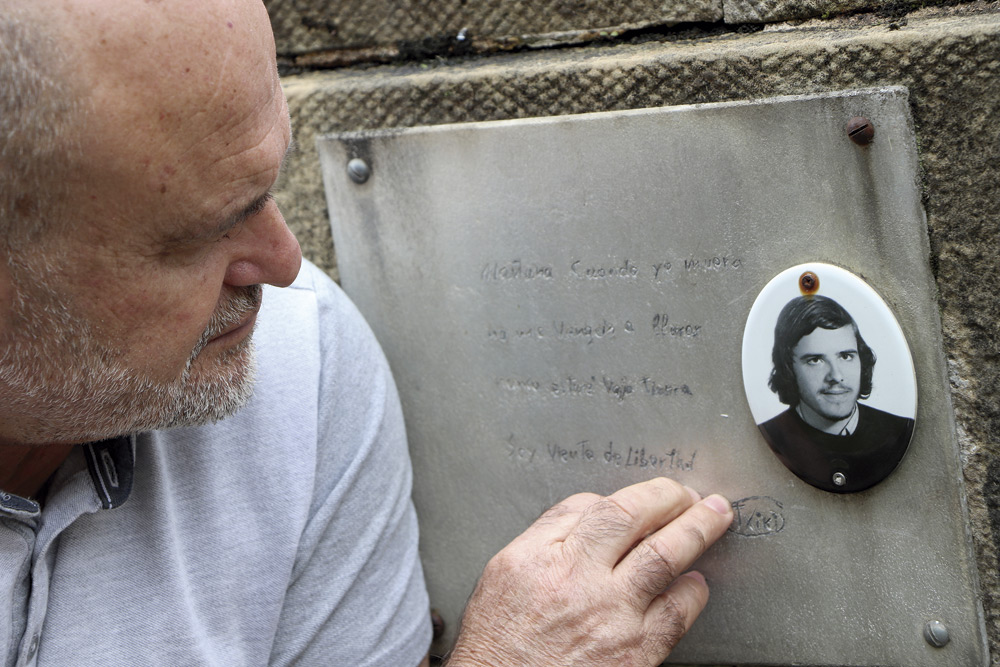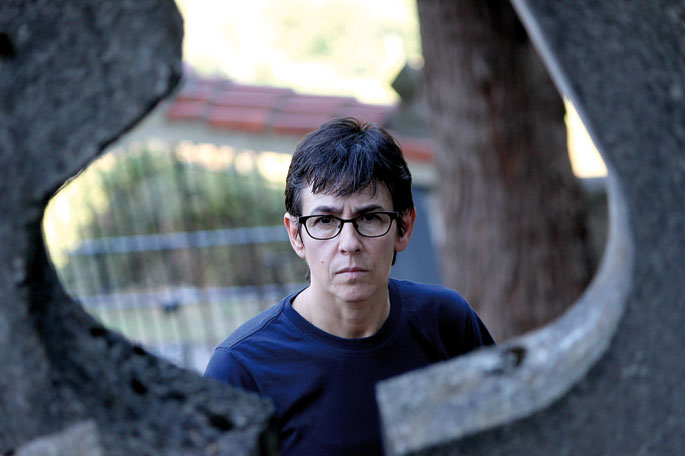"I just want to clean up the name of my brother José Luis"
- Maria Victoria Sánchez-Bravo Solla already has a nephew with five names: Luisa Ramona Humberta is Anjela Juana. The girl bears the names of the five fighters who were shot by the dictator Franco on 27 September 1975. Maria Victoria, the sister of José Luis Sánchez-Bravo Solla, will never forget it.

Arte dramatiko irakasle, oraindik orain sartu da erretretan. 18 urte bete eta ezkondu zen Vigotik Murtziara. Ordurako hila zuen aita. “Ez zuen gerokorik ikusi, zorionez”, esana du María Victoriak, aitak ez baitzuen bizi izan María Victoriak bizitakoa: José Luis fusilatu zutela. Harrezkero, neba José Luisen eta harekin batera fusilatu zituzten lagunen memoriaren zaindari jardun du María Victoriak. Memoriaren institutu osoa da, bera bakarrik, María Victoria Sánchez-Bravo Solla.
José Luis Sánchez-Bravo, Xose Humberto Baena and Ramón García Sanz were shot on 27 September 1975 after the assassination of Txiki and Otaegi.
During the Transition, the parties, the Socialist Party, the Communist Party… and now to whom do I have to claim that my brother was killed? What happens in Spain is a disgrace, it does not happen anywhere. There are those on the far right, the Falangists, going out to the street and beating, insulting or threatening death, like the mayor of Madrid, Manuela, to Carmen. And no punishment. I am not in favour of the independence of Catalonia, but I am not in favour of the call for the referendum to be held in jail. On the contrary, those who are stealing, gluing, frightening people -- they have no punishment. Where is justice? I want to leave Spain! It's outrageous that people vote for them over and over again. It's gross.
You come from Galicia, you grew up in Vigo.
We are Galician by our mother, the father was of Madrid origin. At home it was the second, José Luis the third, a year and a half younger than me. I married 18 years old and came to Murcia, with my husband made here. Meanwhile, Luis, or Luisiño, worked at the institute. As was customary at that time, there was no talk of politics at home. It was Franco. I later learned that my brother was in politics.
You married, you left your parents' home, intermingle with your family. A few years later, José Luis addressed you.
Summer before death. The bride was pregnant and wanted to get married. Luis contacted me so that I could ask Vigo for his birth certificate in order to be able to marry. Luis had already escaped. He is accused of distributing pamphlets at a factory in Vigo, where he is accused of murder. He escaped before the police came to our house. His mother had become so sad that she had no news of Luis for two years. When my brother contacted me, my mother learned that Luis was in Madrid. The Social Policy Brigade persecuted him, the police who shot you, took you to the police station and tortured you. That doesn't count. Neither the PSOE nor the PCE say what was happening at that time.
You saw that my brother had been tortured.
Firsthand. They did it stabbing, bleeding through the jacket, had the torso blackened, the face deformed. And how can the person responsible for these torture, who still lives, be able to walk freely in the street? It is a disgrace. For me, however, they have as much or more guilt as the pp, the parties that say they are left-wing, that have wanted to hide everything in the background. Do we know the People’s Party, where it comes from, where it goes, but the Left is silent? Shame! They deceive the people.

After getting married, in Murcia, you had Silvia and Luis in your house, fugitives.
They were two days in our house and then went to Mazarrón (Murcia, Spain). And [Antonio] Pose was killed by the lieutenant of the civil guard in Madrid [August 17, 1975], his brother was in Murcia with Silvia. I had an old car, but it didn't work and we took a taxi for Luis, Silvia and I to leave Murcia to Mazarrón. When he was accused of having participated in the murder of Pete, I asked the taxi driver to testify how he took us to the three of us a certain day from Murcia to Mazarrón. The brother, who was not accused of being the material author of the murder, was, however, murdered by the Mossos d'Esquadra. They crushed him and tore us apart.
Family, do you mean?
They shattered our family. Another brother, Manuel Ángel, committed suicide years later. He threw himself from a third floor, broke his legs and spent the summer in the hospital. The following year, it didn't fail. On 5 July 1983 he committed suicide for a ninth place. Manuel Ángel did not overcome the pain of his brother's loss. Manuel Anjel did not stop at the night chapel we spent in Carabanchel prison (Madrid, Spain). Their suffering, their powerlessness. He burned his hands with cigarettes… He saw them red, he had no other brother, only his sisters. My sister Dolores F never raised her head. He felt depressed, they filled him with pills, and so he burst. José Luis died in 1975 at the age of 21; Manuel Ángel took his life in 1983 at the age of 25; the third, Dolores Fe, at the age of 33...

What about the pain of parents?
José Luis was the one who most helped his mother at home. “I have not had a son like him,” our mother said, “And they have taken him away from me.” With this pain he lived until his death. I took her to live in Murcia, to my lap. Every now and then I would say: “What do I do live in the world?” He lives and three dead children. He didn't get into his head. Then I said to him, “Mom, I need you!” I told him I needed help, otherwise I thought he was going to leave, because I didn't want to live. It has been hard, it has been hard, and in the end those responsible have been released, nothing has happened here, no sanctions have been imposed, they said that it should be forgotten, that nothing else could be done. Could it not be otherwise at that time, but then not? Those responsible for these crimes had to be cleansed and brought before the judge, if not possible in Spain, outside Spain.
José Luis and his wife Silvia Carretero returned from Murcia to Madrid. When did you hear about them?
When his brother was arrested on 29 August. I read it in the press. I saw my brother's face, unbeliever, because I thought they were still in Mazarrón. Then, as you would expect, I started looking for an attorney. [José María] We went to Gil-Robles, the best at that time. He, on the other hand, did not, but he gave us Paka Sauquillo, Fernando Salas and his office phone. Wonderful lawyers. They took care of it. They tried, but there was nothing to do. Everything was ready. Death penalty. The trial was nothing more than a mock. Tests were not admitted.
He was in the trial.
I was taken out of the room and taken with my mother to the DGS of Madrid [General Safety Directorate], followed by other cars. Behind ours, Billy the Child. Further back, the foreign press. And it was just as bad that foreign journalists were coming in. I think the police took us to the hotel for fear of his testimony, instead of leaving me in the DGS… Meanwhile, in the view room, when his brother was sentenced to death, I yelled “Luis!” and he turned my head. Then one of the cops next to him gave him a handshake to look forward. I started screaming: “Murderers, criminals!” I was taken out of the living room.
The night chapel approached.
Yes. Humberto Baena on one side of the cell, in the central cell, and Ramón [García Sanz] on the other side. José Luis was arrested on 29 August, shot on 27 September, and was still bleeding in his jacket, black, with a lost look. I was torn apart. Her wife, Silvia, was in the prison of Yeserías (Madrid), where she was taken to Madrid for treatment. The night his brother passed by caressing Silvia's belly, which he was waiting for four months. Our family was there, that of Baena had not arrived until the last hour, as the family came from Vigo. Ramón was a godfather and had no news of his mother... We were with José Luis Silvia, my mother, my sister Dolores Fe, my brother Manuel Anjel and the five, and we separated to be also with Baena and Ramón, with whom there was only one lawyer. The night chapel was horrifying. I remember singing songs from Galicia... I do not wish anyone. Now I just want to flush my brother's name. He was not a terrorist, he was not a murderer. As long as I live, I will say: my brother was an honored man, a good, smart man.

Silvia, José Luis's wife, was four months old. The daughter was born, she is secretary of the Spanish embassy in the Netherlands, in The Hague, away from her father's memory.
Of course, he didn't know his father. I was the girl in my eyes, because I was my brother's daughter, and I had two sons, but I have not had daughters. I do not know whether the education he has received at the French Lyceum in Madrid has not departed from his father’s image either. He's 42 years old, and when I turned 18 and they celebrated the End of the Lizard Festival, I stopped having relationships with him. The Hotel Palace in Madrid hosted a great party. Limousine and the Koplowitzs over there. It was contrary to my principles and I did not leave. The girl changed her name: Louise Sánchez Rostou appears, but it's actually Luisa Ramona Humberta Anjela Juana Sánchez-Bravo Carretero.
In addition to his father's name, he bears the name of Humberto Baena, Ramón García Sanzábá, Anjel Otaegi and Juan Paredes Txiki.
He says that he is a very discreet person, that newspapers could insult him. It is possible, we already know the press. But it hurt me that my nephew changed my name, and of course, I didn't go to the party. Since then, I have not heard anything about him again.
Humberto Baena, Ramón García Sanz and his brother José Luis were shot in Hoyo de Manzanares, Madrid.
And there I was. Attorney Fernando Salas and I went to the shooting, but they didn't let us go. However, we clearly heard the shooting, we guessed the silhouettes of the shot. Then, from the location of the shooting, we saw the cops laughing and screaming. I don't know if they had taken or drank any substance, but they were happy, both the civil guards and the police, volunteers who formed the run-up platoons. When we were putting the bodies in the plastic bag, I told Fernando Salas and I, from the black donkey and two to the military judge who gave the ruling. I was pale. I couldn't even like what I saw. They didn't let the press go.
Speaking of cleaning up his brother’s name, in 2012 the Basque Government recognised Txiki and Otaegi as victims of political violence. This same year, the Catalan Parlament has denied the trials that took place during the Franco regime in the Catalan Chamber.
In Spain it is unthinkable. With the pp in power, you can't even imagine it. And when the PSOE has sent, what have they done? I see no difference between them. Where's the difference? And what did the PCE do, what did [Santiago] Carrillo and [Dolores] Ibarruri do? It had to be forgotten. Amnesty for all, one and the other. Also for those who tortured my brother? Amnesty? Oh, yeah! And now what are we seeing? The extreme right is becoming more and more proud. Because they've left it. They are supported by the State, the press and the judicial system. This is Spain, friend, this is Spain. In this town, a lot of people have left us. Because our children, among others, are Sánchez-Bravo. We lived in the street where we were, in Vigo itself, a man who lived up above the sky and down the earth, and who had seen me, and who remembered what he had said to his neighbor: “Look, sister of the terrorist!” Like the one who doesn't eat, the one who votes for PP. Who could understand it? We're crazy. The world is upset. I don’t understand… Hey, Otaegi was shot, and the other one? Did they shoot him? It was Garmendia, right?
Yes, José Antonio Garmendia Artola.
I remember ...
“Orain Espainiako errege-erregina emeritu direnei telegramak bidali nizkien, eta [Vicente Enrique] Tarancón kardinalarekin hitz egiten ere saiatu nintzen. Gau osoa eman nuen haren jauregiaren atarian, errezibitu zain, beste kondenatu baten ahizparekin. Tarancónen Mercedes beltz handiaren aurrean ere paratu ginen. Aita santua Madrilera etortzeko eskatzen genuen, Franco eskomikatzea. Baina diplomazia nagusitu zen, eta horrela hil zituzten bostak”
“Lehengo batean, lagun batekin alderdi politikoen gainean ari ginela, leku guztietan zakurrak oinutsik direla esan zidan.
Baina ez da egia. Batzuk lapurreta bizian ari dira. Beste batzuk, aldiz, etxerik gabe daudenen alde ari dira, dirurik ez dutenen alde lanean. Ez, ez, leku guztietan zakurrak oinutsik ez”
“Podemos-en sartu nintzen, ustez hortik onik etorriko zelakoan, baina ez da etorri. Asmoa zuzena zen, baina gizakiak huts egin du. Manuela Carmena, Ada Colau… miresgarriak zaizkit, baina zaila da inork besteren ongiaren alde bere burua erabat eskaintzea.
Botereak usteldu egiten du gizakia, askok esan dute nik baino lehen, eta ez da gezurra”
“Guztiaren gainetik, gauza bat azpimarratu behar da: kalean libre dabilen Billy el Niño [Antonio González Pacheco, frankismo garaiko polizia, Poliziaren Goi-mailako Kidegoko inspektore Trantsizioan] epailearen aurrera eraman behar dela, justizia egin eta geratzen zaizkion egunak kartzelan igaro ditzan. 70 urte izango ditu honezkero. Igaro ditzala barruan geratzen zaizkion urteak”
Irailak 27, krimenaren +42. urtea. Gezurra dirudi Bartzelona urrunean abokatu zahar bati eztarria korapilatzea, euskaldunok espektakulutan entreteniturik gabiltzan bitartean.
Tramitera ere ez dute onartu auzitegiek eskaera. Azpeitiko Udalak eta familiak frankismoaren krimenen kontrako Argentinako kereilara batuko dute kasua.
Haren hilketaren erantzuleak zeintzuk diren argitzea eta horiei ardurak eta erantzunkizunak eskatzea nahi dute. Horretarako, sumarioaren kopia bat eskuratzea nahi dute. Bidea "zaila" izango dela azaldu du Angel Otaegiren familiako abokatuak, baina "merezi"... [+]


















